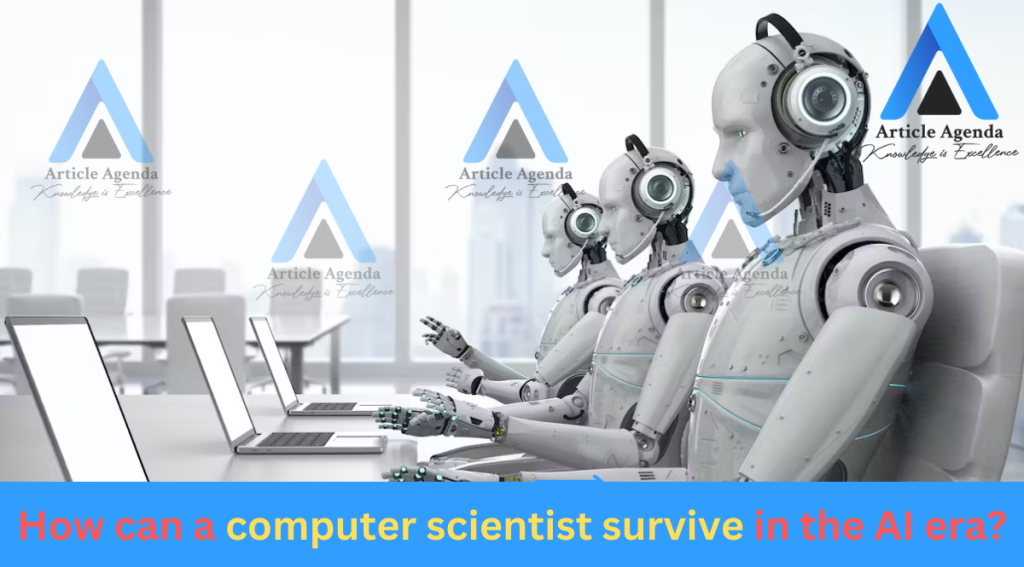Introduction to the AI era
The advent of artificial intelligence (AI) has revolutionized various industries, making it an exciting time to be a computer scientist. AI can potentially transform how we work, live, and interact with technology. As a computer scientist, it is crucial to understand the implications of AI and adapt to the changing landscape. In this article, we will explore the role of computer scientists in the AI era, the critical skills required to thrive, and the impact of AI on job prospects.
Table of Contents
The role of a computer scientists in the AI era
Computer scientists play a vital role in developing and implementing AI technologies. They are responsible for designing algorithms, developing machine learning models, and creating intelligent systems. In the AI era, computer scientists need to deeply understand data analysis, machine learning, and programming languages. Their expertise is crucial in training AI models, fine-tuning algorithms, and ensuring the ethical use of AI technologies.
Moreover, computer scientists are at the forefront of solving complex problems through AI. They work on developing AI-powered solutions for healthcare, finance, transportation, and many other domains. By leveraging their skills and knowledge, computer scientists can significantly contribute to society and drive innovation in the AI era.
Critical skills for a computer scientists in the AI era
To thrive in the AI era, computer scientists must acquire critical skills. Firstly, a strong foundation in mathematics and statistics is essential. Understanding linear algebra, calculus, and probability theory is crucial for developing and improving AI algorithms.
Secondly, proficiency in programming languages such as Python, Java, or C++ is vital. Computer scientists must be able to write efficient and scalable code to implement AI algorithms and models. Additionally, familiarity with libraries and frameworks like TensorFlow, PyTorch, and sci-kit-learn is advantageous for building AI applications.
Furthermore, expertise in machine learning and deep learning is a must. Computer scientists should be well-versed in various algorithms, such as decision trees, support vector machines, and neural networks. They should also have hands-on experience in training and fine-tuning models using large datasets.
Read More : Unlocking the Power of Chat GTP: Revolutionizing Conversations and Boosting Engagement
Adapting to the changing landscape of AI
As AI continues to evolve, computer scientists must adapt to the rapidly changing landscape. Staying updated with the latest research papers, conferences, and industry trends is essential. This can be achieved by regularly reading scientific journals, attending workshops, and participating in online courses.
Additionally, a computer scientists should actively engage in open-source projects and collaborate with other professionals in the field. Computer scientists can expand their knowledge, gain valuable insights, and build a solid professional network by contributing to the AI community.
Embracing AI technologies and tools
Computer scientists must embrace AI technologies and tools to survive in the AI era. They should familiarize themselves with popular AI frameworks, cloud platforms, and development tools. Cloud platforms like Amazon Web Services (AWS) and Google Cloud Platform (GCP) provide a scalable and cost-effective infrastructure for deploying AI applications.
Moreover, a computer scientists should explore AI-related tools for data preprocessing, model development, and visualization. Tools like Jupyter Notebook, Pandas, and Matplotlib can streamline AI development and enhance productivity.
Computer scientists can leverage their potential by embracing AI technologies and tools and significantly contribute to the field.
The impact of AI on job prospects for computer scientists
AI has undoubtedly disrupted the job market, including the field of computer science. While some fear job loss due to automation, AI has created new opportunities for computer scientists. The demand for AI experts, data scientists, and machine learning engineers has skyrocketed recently.
Tech companies, research institutions, and startups highly seek computer scientists with expertise in AI. They are involved in developing AI-powered products, improving existing systems, and driving innovation. The job prospects for computer scientists in the AI era are promising, provided they possess the necessary skills and stay updated with the latest advancements.
Continuing education and professional development in AI
To thrive in AI, computer scientists must prioritize continuing education and professional development. They should regularly enroll in courses, workshops, and certifications to enhance their skills and knowledge. Online platforms like Coursera, Udemy, and edX offer various AI-related courses, covering topics from machine learning basics to advanced deep learning.
Furthermore, computer scientists should attend conferences and seminars to stay abreast of the latest research and industry trends. These events provide opportunities to learn from experts, network with professionals, and showcase their work.
Computer scientists can stay competitive and adapt to the evolving AI landscape by investing in continuing education and professional development.
Networking and collaboration opportunities in the AI industry
Networking and collaboration play a crucial role in the success of computer scientists in the AI industry. Computer scientists can gain access to job opportunities, collaborations, and mentorship by building a solid professional network.
Attending industry conferences, meetups, and workshops provides a platform to connect with like-minded individuals and experts in the field. Online communities and forums, such as Reddit and Stack Overflow, are valuable resources for networking and seeking advice.
Collaboration with researchers and professionals from diverse backgrounds can foster innovation and lead to groundbreaking discoveries. By working together, computer scientists can tackle complex AI challenges and push the boundaries of what is possible.
Read More : Introduction to the Ethics of AI
Challenges and opportunities for computer scientists in the AI era
While the AI era brings immense opportunities, it also challenges computer scientists. One of the significant challenges is the ethical use of AI. Computer scientists must ensure that AI models and systems are fair, transparent, and unbiased. They should be aware of the ethical implications of their work and strive to mitigate any potential harm caused by AI technologies.
Another challenge is the rapid pace of technological advancements. Computer scientists must constantly update their skills to keep up with AI tools and techniques. This requires a commitment to lifelong learning and adaptability.
Despite the challenges, the AI era presents numerous opportunities for computer scientists. They have the chance to make groundbreaking discoveries, solve pressing societal problems, and contribute to developing AI technologies that can improve lives.
Conclusion: Thriving in the AI era as a computer scientist
The AI era offers immense possibilities for computer scientists. Computer scientists can thrive in this exciting era by acquiring the necessary skills, staying updated with the latest advancements, and embracing AI technologies. Adapting to the changing landscape, continuing learning, and actively engaging in networking and collaboration opportunities is crucial.
While challenges exist, computer scientists can leverage their expertise to drive innovation and contribute to developing ethical AI systems. Computer scientists can survive and thrive in AI by embracing opportunities and overcoming challenges.
Latest Post :
-
What Is Page Speed & How to Improve It
In the digital age, page speed is a critical factor that affects user experience, search engine rankings, and overall website performance. This article delves into what page speed is, why it matters, and actionable steps to improve it, ensuring that your website delivers a fast, seamless experience to users. Understanding Page Speed Page speed refers…
-
How CPEC is Shaping Business and Investment Opportunities in Pakistan
The China-Pakistan Economic Corridor (CPEC) is a flagship project under China’s Belt and Road Initiative (BRI), aimed at enhancing regional connectivity and fostering economic development. Launched in 2013, CPEC is a comprehensive framework of infrastructure projects, including highways, railways, and energy pipelines, intended to modernize Pakistan’s infrastructure and strengthen its economy. This article explores how…
-
The Rise of Sustainable Businesses in the UAE: How Eco-Conscious Practices are Driving Growth
The United Arab Emirates (UAE) is renowned for its rapid economic development, futuristic architecture, and thriving business environment. In recent years, the UAE has also emerged as a leader in sustainable development, embracing eco-conscious practices that are transforming its business landscape. This article explores the rise of sustainable businesses in the UAE, highlighting how environmental…

